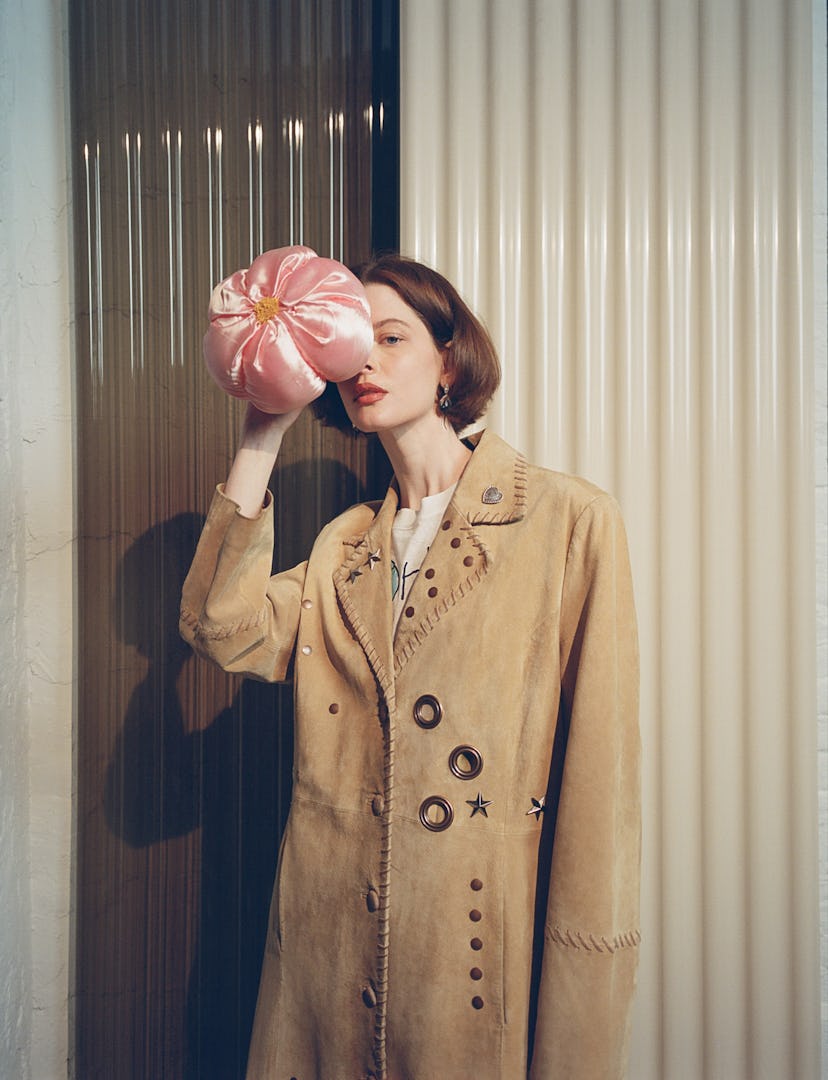Just around the corner from the bustling liveliness of 8th Avenue in New York City, two patio chairs and a hand-painted sign mark the entrance to Eva Joan, a small shop in the West Village that provides a new approach to clothing alteration. The crafty brainchild of Emma Villeneuve and Bjorn Eva Park, two former production and set designers, Eva Joan’s services range from standard tailoring to reworking pieces entirely, giving them new life through custom patches and embroidery that serve as both functional repairs and personal embellishments. “One customer gave me seven of his children's shirts to turn into patches on the knees of his jeans,” Park told me when I went to visit on a recent afternoon.
The concept of reworking and reusing existing garments — otherwise known as sustainable, “slow,” conscious or upcycled fashion — is far from new. Brands from Bode to Re/Done have embraced the use of antique or deadstock materials in their designs. But what sets Eva Joan apart is the ethos at its core: getting the customer involved in the upcycling process—even if they don’t know their way around a sewing machine—while encouraging them to reevaluate what’s in their closets. Could that ripped shirt in the back of your armoire be reworked into part of a jacket? Perhaps even an old moth-eaten coat could be brought back to life with some floral embroidery? In the capable and creative hands of Villeneuve and Park, everything has potential and nothing is wasted.
Park and Villeneuve.
“What happens a lot with sustainability is that people are like, How do I even begin?” Park said. She shared her own frustrations with trying to get conventional tailors to take on out-of-the-box projects, like replacing the sleeves of a vintage bomber jacket with floral deadstock fabric, or sewing up holes with multicolored threads: “We spent so much time searching, and I had gone to literally every tailor being like, ‘I’m begging you to do this.’ But they constantly talked us out of everything, so I think what is getting people really excited about what we do is that we’re happy to do the heavy lifting.”
The name and the mission of their business is inspired by their grandmothers, who taught them the value of repairing and customizing clothes at a young age. “Anything that could get fixed was going to be fixed, but it was seen as an evolution and an opportunity to make something personal—never as a problem,” Park told me, as Villeneuve and her dog, Bear, a beloved store regular, watched a customer pick out a handmade butterfly patch. “Aside from it being sustainable and using what already exists in your own closet, we also selfishly just loved this idea,” added Villeneuve. “This is our dream middle school project.”
Inside the shop, which moved to its current location in January of this year after 18 months in a nearby space, the walls are lined with deadstock fabrics, a small rack of original designs made from salvaged pieces, and a dye station, all of which surround a wooden table bathed in a beam of light, beckoning a sort of communal presence. It’s rare for such a valuable slice of space in New York real estate to maintain a sense of DIY optimism, which makes the fact that the two have managed to create such an environment all the more remarkable—there isn’t a monstera plant or slab of terrazzo in sight. “We always had this idea of a big table because it shouldn't feel like it's just a quick interaction. Sometimes tailoring and all of this stuff, it’s very intimidating. And so we try to sit with the customer and discuss what is going to go into each garment so that they're learning while creating,” Park said.
Although they have no intentions of offering training services, Park and Villeneuve hope Eva Joan can help spread a message about approaching your clothes with a more sustainable mindset: Just because a piece is damaged, stained, or out of style doesn’t mean its life is over, it’s just ready for a new era. “Taking credit is not what we’re interested in, that's why we don't put tags on a lot of things. We just want you to know that this is a possibility and that you have enough inside of you to do this,” Park continued. “We document it for fun because we think things are cool, but it truly is not about us, it's just about what they’re making for themselves.”
In a world spinning on an axis of consumerism, Park and Villeneuve are offering various routes towards a more sustainable life. A custom repair project can range from $65 for patching up a pair of jeans to $250 and up for a more complex, like reworking a collection of ties into a jacket. But along with their rack of $100-$200 Eva Joan originals, there are also baskets of handmade patches that customers can choose from, for around $10 dollars. “There has to be some entry point. For people to understand, they have to get excited and they have to be inspired,” Villeneuve said.
However you find your way into their world, Park and Villeneuve’s shared goal is to make people understand that upcycling can be artistic, personal, and exhilarating. “I think people catch the bug,” Park noted. “Once they get going, it’s a very addicting thing to make things your own.”
This article was originally published on
